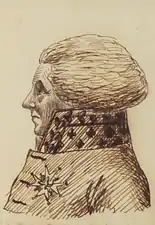Henri-Cardin-Jean-Baptiste d'Aguesseau
Henri-Cardin-Jean-Baptiste d'Aguesseau, Marquis d'Aguesseau (23 August 1752, in Paris – 22 January 1826), grandson of the French chancellor Henri François d'Aguesseau, was advocate-general in the parlement of Paris and deputy in the Estates-General. Under the Consulate he became president of the court of appeal and later minister at Copenhagen. He was elected to the Académie française in 1787.
Henri-Cardin-Jean-Baptiste d'Aguesseau | |
|---|---|
 | |
| Born | 23 August 1752 |
| Died | 22 January 1826 |
| Occupation | Politician, diplomat |
| Signature | |
 | |
| Position held | seat 11 of the Académie française (1787–1826) |
%252C_pair_de_France.svg.png.webp)
Works
Of d'Aguesseau's works the most complete edition is that of the eminent lawyer Jean Marie Pardessus, published in 16 vols. (1818–1820); his letters were edited separately by Rives (1823); a selection of his works, (OEuvres choisies, was issued, with a biographical notice, by E Falconnet in 2 vols. (Paris, 1865).)[1]
The far greater part of his works relate to matters connected with his profession, but they also contain an elaborate treatise on money; several theological essays; a life of his father, which is interesting from the account which it gives of his own early education; and Metaphysical Meditations, written to prove that, independently of all revelation and all positive law, there is that in the constitution of the human mind which renders man a law to himself.[1]
See Boullée, Histoire de la vie et des ouvrages du chancelier d'Aguesseau (Paris, 1835); Fr. Monnier, Le Chancelier d'Aguesseau (Paris, 1860; 2nd ed., 1863); Charles Butler, Mem. of Life of H. F. d'Aguesseau, etc. (1830). [1]
Notes
- Chisholm 1911, p. 428.
References
- This article incorporates text from a publication now in the public domain: Chisholm, Hugh, ed. (1911). "Aguesseau, Henri François d'". Encyclopædia Britannica. Vol. 1 (11th ed.). Cambridge University Press. pp. 427–428.